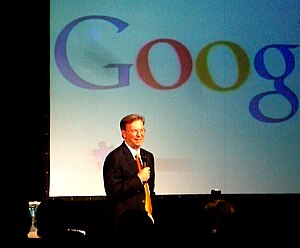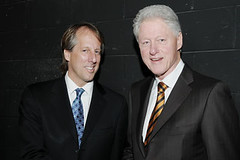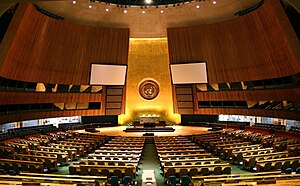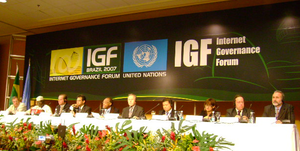 Image via Wikipedia
Image via WikipediaOnly recently, the world witnessed two major information earthquakes due to the Internet. The first in the form of the confidential cable leaks from Wikileaks and the second in the form of removal of the Tunisian dictatorship. How do these two incidents impact the future of the Internet and its governance and how do global powers as well as country governments respond to such happenings. This is still an evolving debate and the blame game is going on all across the world with the affected reacting in ways that is amazing the world citizenry. I do not have to mention any specific country names or people since the global press and media is effectively doing that already but it is important to note here that how will the world react towards this feature of the Internet that promotes both transparency and disruption within the social, economic and political processes across the globe?
It can be observed that after what happened in Tunisia, with the the viral information spreading like a wild fire across the Internet, various nations with dictatorships in the continent of Africa have been reported to be fearing what I also consider as the Wikileaks Effect. After all that has happened so far, the Wikileaks Effect can be defined as a phenomenon that causes an individual, group, gathering, community, organization, political party, government or dictatorship to rethink the repercussions that can be caused due to the leakage of any confidential information about them as well as what can happen after another party gains free access to information that they cannot control on the Internet. Following this fear is the blame game phase that evolves as the leak of information occurs and causes the damage in whatever form it can. Who is to blame?
There is a duality in this discussion about who is to blame. The Tunisian's already knew about the corruption issues and the same goes with the citizenry of almost every country. Then why do these blame games erupt right after such information leaks? I call this the Post-Wikileaks Effect Syndrome where there has to be someone that has an answer detailing who did it or what we may call the finger-pointing phase. The following video report of the blame game over Wikileaks is an example of the Post-Wikileaks Effect Syndrome:
So what are we seeing here now? Is Wikileaks going to provoke governments across the world to kill the Internet or at least kill the access to information that they cannot control as defined in the Wikileaks Effect above? I am using the term ""Killing the Internet" metaphorically in the context of the global battle over information control over the Internet that may effect the norms and principles that enable the functioning of a single and sustainable Internetwork.
Totally out of context, let me just share a small example of whats happening with regards to data protection within the technology consumer markets. It is well perceived that the Wikileaks leaking of cables happened a great deal due to someone gaining access to unsecured data and information. According to ZDNet here, the Wikileaks incident caused 40 percent of their readers in the U.S. to at least think about better security procedures and 20 percent across the globe are also considering the same. The results can be viewed here.
This brings us to what Internet users consider as the attempt to kill the Internet and how to preserve the basic existence of the network that I once again can connect to the Post-Wikileaks Effect Syndrome because it is an issue of being paranoid that something may be happening to the Internet and only in the context of one country whereas the Internet today is perceived by the global citizenry to exist as a global asset not owned by anyone country or government. The following video by ZDNet is from a an event at the Churchill Club in Santa Clara where Neville Roy Singham, Founder of Thoughtworks made a case for why the core values of the Internet, including the freedom of press are possibly at risk amidst the WikiLeaks revelations (originally here):
So after the Wikileaks Effect and the Post-Wikileaks Effect Syndrome, can the Internet be preserved from being killed? Can the core values that are well perceived norms by the global citizenry still be preserved from a possible takeover? Can the lacking of controlling every possible tidbit of information over the Internet prevent countries from trying to control even those tidbits? There is no possible answer to these questions as one person cannot represent a global point of view but I would like to share an important insight into these issues through an interesting and eyeopening analysis here by Dr. Jovan Kurbalija of Diplo Foundation titled "After the deluge: Internet governance in the aftermath of WikiLeaks" that indicates a global battle that can possibly hurt, change or kill the way the Internet is governed. The following prediction about Internet Governance is worth noting:
"In 2011, we can expect that many national governments will adopt a two-track policy. On the one hand, they will continue reclaiming control of their national e-spaces, with the risk of fragmentation of the global Internet. On the other hand, they will accelerate pressure on the USA towards complete internationalisation of Internet governance and, in particular, of ICANN.
Paradoxically, the USA, which has resisted the internationalisation of Internet governance, may become one of its main proponents in 2011. With almost all major Internet companies based in the USA (Google, Facebook, Yahoo), and most Internet traffic passing through the USA, and with English as the main language, the main sufferer of a possible Internet fragmentation could be the United States. For example, if other countries start creating their own national clouds, the main casualty will be companies like Amazon, Google, and Facebook."
Following the afore discussion, who can we really say is killing the Internet? Is this is because of the Wikileaks Effect or is it because of the Post-Wikileaks Effect Syndrome? I leave this to the readers to decide! This post may seem speculative but really, this is food for thought. It may be agreed to a great extent that Wikileaks has really caused the world to rethink issues pertaining to the governance of the Internet. No one had the idea that the Wikileaks ripple would go as far as this to stimulating a Jasmine Revolution in Tunisia and then causing disturbance in the norms and principles of the Internet. Issues like creating Internet Policing and independent Internet Policy and Regulation body have emerged out of government discussions with regards to Internet Governance and this could have far reaching implications for the future and governance of the global network!
It can be observed that after what happened in Tunisia, with the the viral information spreading like a wild fire across the Internet, various nations with dictatorships in the continent of Africa have been reported to be fearing what I also consider as the Wikileaks Effect. After all that has happened so far, the Wikileaks Effect can be defined as a phenomenon that causes an individual, group, gathering, community, organization, political party, government or dictatorship to rethink the repercussions that can be caused due to the leakage of any confidential information about them as well as what can happen after another party gains free access to information that they cannot control on the Internet. Following this fear is the blame game phase that evolves as the leak of information occurs and causes the damage in whatever form it can. Who is to blame?
There is a duality in this discussion about who is to blame. The Tunisian's already knew about the corruption issues and the same goes with the citizenry of almost every country. Then why do these blame games erupt right after such information leaks? I call this the Post-Wikileaks Effect Syndrome where there has to be someone that has an answer detailing who did it or what we may call the finger-pointing phase. The following video report of the blame game over Wikileaks is an example of the Post-Wikileaks Effect Syndrome:
So what are we seeing here now? Is Wikileaks going to provoke governments across the world to kill the Internet or at least kill the access to information that they cannot control as defined in the Wikileaks Effect above? I am using the term ""Killing the Internet" metaphorically in the context of the global battle over information control over the Internet that may effect the norms and principles that enable the functioning of a single and sustainable Internetwork.
Totally out of context, let me just share a small example of whats happening with regards to data protection within the technology consumer markets. It is well perceived that the Wikileaks leaking of cables happened a great deal due to someone gaining access to unsecured data and information. According to ZDNet here, the Wikileaks incident caused 40 percent of their readers in the U.S. to at least think about better security procedures and 20 percent across the globe are also considering the same. The results can be viewed here.
This brings us to what Internet users consider as the attempt to kill the Internet and how to preserve the basic existence of the network that I once again can connect to the Post-Wikileaks Effect Syndrome because it is an issue of being paranoid that something may be happening to the Internet and only in the context of one country whereas the Internet today is perceived by the global citizenry to exist as a global asset not owned by anyone country or government. The following video by ZDNet is from a an event at the Churchill Club in Santa Clara where Neville Roy Singham, Founder of Thoughtworks made a case for why the core values of the Internet, including the freedom of press are possibly at risk amidst the WikiLeaks revelations (originally here):
So after the Wikileaks Effect and the Post-Wikileaks Effect Syndrome, can the Internet be preserved from being killed? Can the core values that are well perceived norms by the global citizenry still be preserved from a possible takeover? Can the lacking of controlling every possible tidbit of information over the Internet prevent countries from trying to control even those tidbits? There is no possible answer to these questions as one person cannot represent a global point of view but I would like to share an important insight into these issues through an interesting and eyeopening analysis here by Dr. Jovan Kurbalija of Diplo Foundation titled "After the deluge: Internet governance in the aftermath of WikiLeaks" that indicates a global battle that can possibly hurt, change or kill the way the Internet is governed. The following prediction about Internet Governance is worth noting:
"In 2011, we can expect that many national governments will adopt a two-track policy. On the one hand, they will continue reclaiming control of their national e-spaces, with the risk of fragmentation of the global Internet. On the other hand, they will accelerate pressure on the USA towards complete internationalisation of Internet governance and, in particular, of ICANN.
Paradoxically, the USA, which has resisted the internationalisation of Internet governance, may become one of its main proponents in 2011. With almost all major Internet companies based in the USA (Google, Facebook, Yahoo), and most Internet traffic passing through the USA, and with English as the main language, the main sufferer of a possible Internet fragmentation could be the United States. For example, if other countries start creating their own national clouds, the main casualty will be companies like Amazon, Google, and Facebook."
Following the afore discussion, who can we really say is killing the Internet? Is this is because of the Wikileaks Effect or is it because of the Post-Wikileaks Effect Syndrome? I leave this to the readers to decide! This post may seem speculative but really, this is food for thought. It may be agreed to a great extent that Wikileaks has really caused the world to rethink issues pertaining to the governance of the Internet. No one had the idea that the Wikileaks ripple would go as far as this to stimulating a Jasmine Revolution in Tunisia and then causing disturbance in the norms and principles of the Internet. Issues like creating Internet Policing and independent Internet Policy and Regulation body have emerged out of government discussions with regards to Internet Governance and this could have far reaching implications for the future and governance of the global network!















